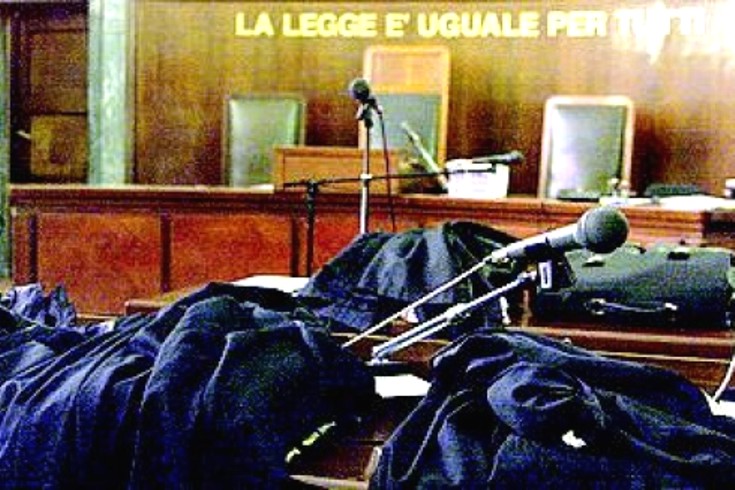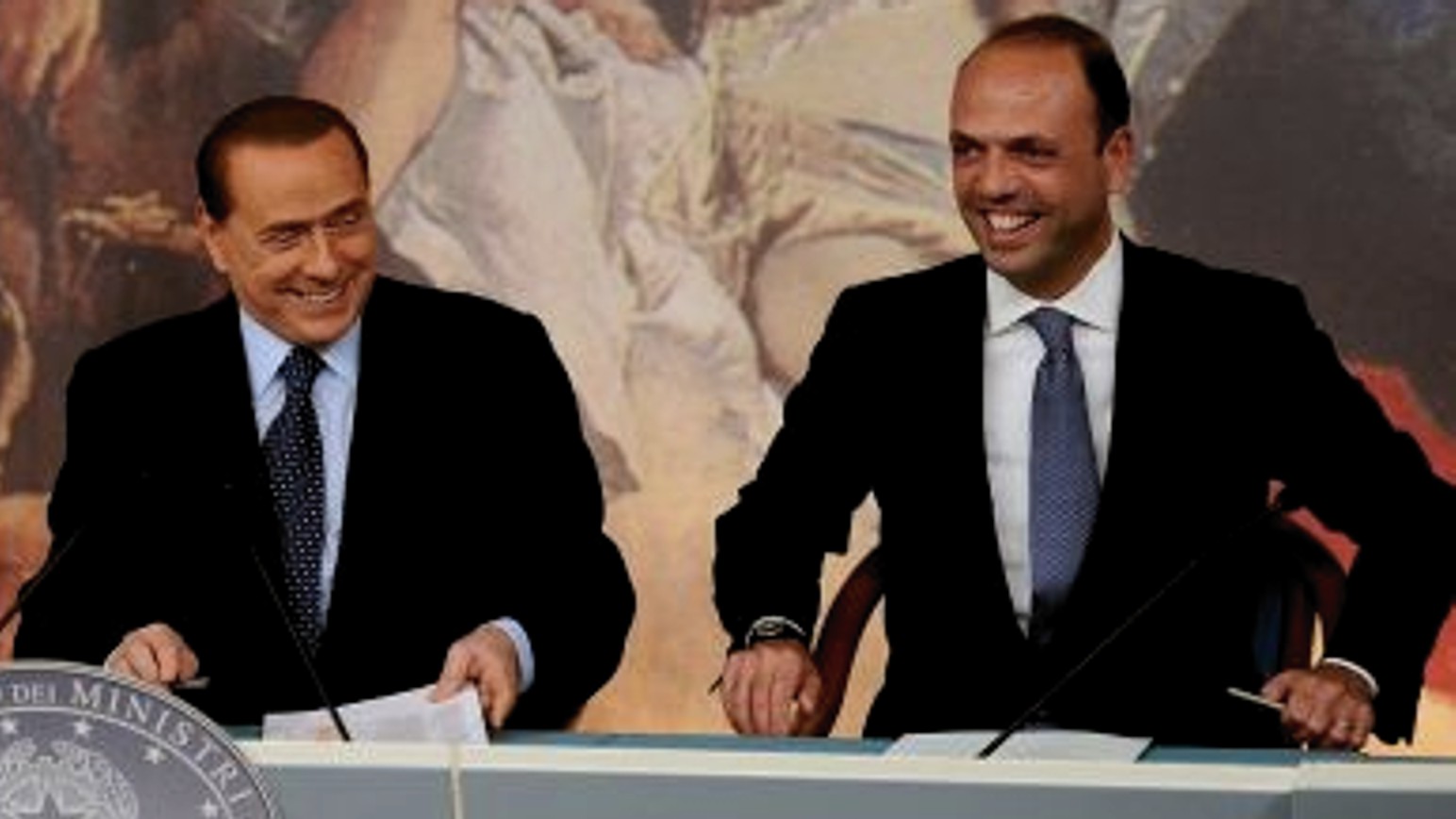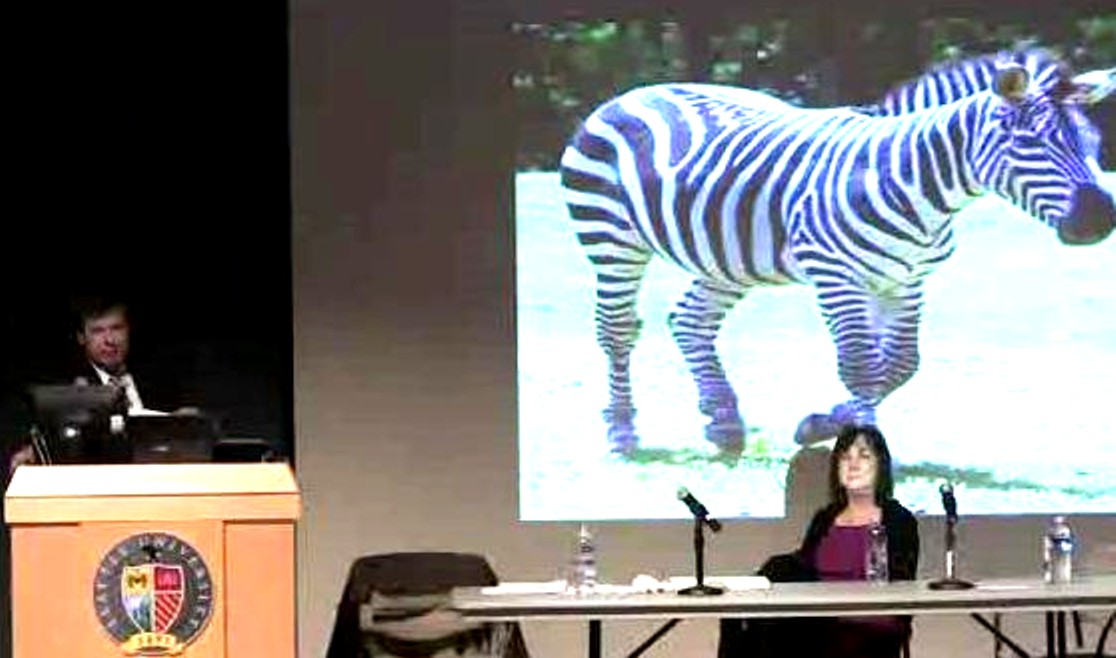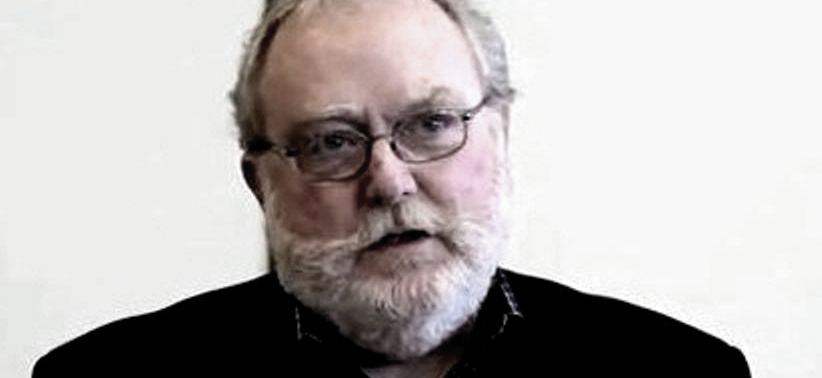
Tuesday, November 22, 2011
Mignini’s And Giuttari’s Florence Convictions Are Annulled: No Evidence, And No Jurisdiction
Posted by Peter Quennell

The ANSA news service is reporting that Giuliano Mignini’s and Michele Giuttari’s 2010 convictions have been annulled.
The Florence appeal court ruled scathingly that no evidence exists and also that the Florence trial court did not have jurisdiction. The case might be looked at again by the prosecutors in Turin or Genoa, which Mignini and Giuttari favor to get the spurious case against them more than just annulled. They’d like its root causes brought out. .
Mignini had caught the exact-same Florence prosecutor on tape, with a judge’s consent, bewailing the fact that the Monster of Florence cabal was tying his hands. That trial was simple a panicky attempt to get himself out from under which will hurt his career and the trail judge’s too.
It wasn’t Mignini who invented the Florence cabal (or satanic sect) notion, and he is suspicious of people (like Preston and Spezi) who work so hard to deny it. Many of the Italian Monster of Florence books also argue 180 degrees away from Preston. Hmmm. What hold does the Monster of Florence sect have over Preston? Is he a secret satanist?! The world really wants to know…
Mignin’s quoted remarks outside the appeal court make it sound like he would like to resume the investigation of why Dr Narducci died suspiciously in Lake Trasimeno. That had to be halted because the Florence prosecutor seized all the papers on the case.
We have posted several times as much on Mignini as most of the UK and US media combined, and we translated a long email from him, and two long and very revealing interviews.
Kermit’s contrast of Preston’s satanic obsessions with Mignini’s really very mundane interests are an absolute must-view.
Tuesday, November 15, 2011
Italian Lawyers Strategically Timed Strike This Week Causes Postponement Of Knox Calunnia Case
Posted by Peter Quennell

The legal action for criminal slander against Amanda Knox brought by those she claimed maltreated her at an interrogation (not by Mignini) is postponed to mid-May 2012.
This has the effect of putting the court dates past the release of the Hellman sentencing report due latest at year’s end and the filing of the grounds for appeal before the Supreme Court of Cassation due six weeks later.
The main lawyers union in Italy has chosen this week for their industrial action to protest the recent history of extreme political pressure by ex-PM Berlusconi’s party on the justice system, resulting in among other things the underfunding of the police’s forensic operations.
The lawyers’ union also has a long list of requested legal reforms which has long been stalled in the parliament. Lawyers are not expected to be alone in making their bids forcefully in this period as the Italian public sector budgets shrink.
Amanda Knox’s position on the calunnia charge seems weak as she herself at other times said she was treated well, she cannot identify who she claims hit her, and she has no witnesses corroborating her story and up to a dozen denying it.
Her own lawyers filed no mistreatment complaint and very publicly in a media crowd said no hitting ever happened. Knox has already served a three year sentence for criminal slander against Patrick Lumumba.
Most trials for calunnia, a serious charge due to the personal damage inflicted, result in conviction.
Friday, November 11, 2011
Italy Really Lucks Out With An Exceptional President And Now An Exceptional New Prime Minister
Posted by Peter Quennell
Italy already possesses in President Napolitano one of the more popular and effective presidents in the world
Now President Napolitano has handpicked Dr Mario Monti to succeed PM Silvio Berlusconi, starting out perhaps as soon as tomorrow. Dr Monti is the president of one of Italy’s premier business schools in Milan, and he has twice been elected a European commissioner.
Other heads of government and stock and bond markets around the world seem increasingly optimistic that Italy can now manage to pull out of its nosedive. Italy’s austerity package as mandated by the EC has already been passed by the upper house in the Rome parliament.
Below is the only video (a few months old) we can spot in which Mario Monti speaks in English at length. And here in Business Insider is a short balanced assessment of Italy’s new prospects.
So. Fingers crossed but the trend looks promising. Enjoy your very overdue retirement, Mr Berlusconi. Keep out of prison…
Wednesday, November 09, 2011
Why The Analysis Of Evidence, Open Questions, Scenarios, And Bigger Issues Won’t Go Away At All Soon
Posted by Peter Quennell

[Above: Raffaele Sollecito, facing Meredith, giving his weak best shot at explaining what “really” happened]
Poor David Marriott. He seems to be embarked on some mind-numbing attempts to try to correct a real mess that is very largely of his own making.
The campaign’s demonization of Italy and the police and prosecution and objective media and internet supporters of justice seem to have painted Knox and Sollecito into an impossible corner. Media sources are telling us that a large minority in the US and UK and a large majority in Italy believe RS and AK still have explaining to do, and that the open questions are far from going away. And that new people have begun digging.
Innocent people when freed from prison are expected to be putting themselves out there brightly on TV almost daily, showing us how seriously attractive and compelling they are, and putting to bed the many open questions. And their online buddies would be presumed to be equally warm and compelling.
Instead, Sollecito’s major appearance on Italian TV last week consisted of a narcissistic hour-long whine which answered none of the tough questions and seems to have won him no new converts. And Knox is giving the appearance of remaining very tightly chaperoned and deeply tongue-tied while the weeks before she actually speaks out turn into months.
Both families seem extremely jittery about what bad things could happen if the two ever connect up again. Perhaps especially if unscrupulous media arranged for the conversations to be bugged. And their online supporters seem as over-the-top as ever - perhaps more-so if they feel they deserve some quality time with Amanda.
The hard evidence and open questions and scenarios we continue to explore on PMF and TJMK are not driven by a hatred of AK or RS.
No very popular websites flourish for years based mostly or entirely on hate. Here on TJMK we very rarely post exclusively on either AK or RS and we post far more often on the much more exceptional person that was Meredith. All of us think the slamming of Italy has been unfair, and the huge majority of our posts concentrate directly on the hard evidence and scenarios and open questions and wider contexts affecting the case.
Our takes on possible motive and psychology continue to presume that Judge Micheli essentially got it right (and Judge Massei who may have blinked rather less-so): that what culminated in Meredith’s cruel death started out as a vicious hazing, for any of various possible reasons: jealousy and competitive rage, fear of being displaced as a waitress, an argument over drug-dealing in the house, use of skunk cannabis or cocaine which causes psychotic episodes, an argument over theft of money, an assumed Halloween night snub, untreated mental illness, and so on. And that the forced-sex aspects were most likely to pour on the humiliation and to aid the cover-up.
Lawyers posting on PMF and TJMK and some others who don’t but talk with us are suspecting that Judge Hellman, in his blunt refusal to allow the prosecution any DNA re-testing, in his jury briefing, in his garbled announcement of the appeal verdict, and in his contradictory comments in the next several days, may have made enough legal mistakes for a 75% probability that the Supreme Court will insist on a major revisiting of the case or even a complete new appeal trial.
We now have on PMF and TJMK over 1,000 pages of translation which is absolutely vital for people in the US and UK to understand the case as Italians have always seen it. That includes both the Micheli and Massei sentencing reports. The massive hard evidence and massive suspicious behavior and highly contradictory alibis and literally hundreds of open questions are described under the various headings in our right column.
And the many scenarios in which prosecutors, judges and our own posters have sought to create a complete narrative to explain what resulted in Meredith’s death are all set out here. In the last few days, many of our members have been doing a terrific job in the comments, filling out some of those scenarios.
Yesterday one of our commenters, Martin, added a post-liberation scenario as his take on what is really going on, and he okayed us to post it here.
I’d like to take a brief moment to parse the present situation and the reports that come to us from various sources, and to consider the message behind the headlines and beneath the surface. We have photos and abundant reports of the Defendant with her latest victim in Seattle. Both her absence of moral restraint and her familiar pattern of seeking immediate gratification remain unchanged. The familiar pattern is aptly described by Sollecito:
“She lived her life like a dream, she was detached from reality, she couldn’t distinguish dream from reality. Her life seemed to be pure pleasure; she had a contact with reality that was almost non-existent.”
The message that she sends to Sollecito is “stay away”; or, if you do come for a brief visit, I am not interested in anything romantic because I already am with someone else; so sorry. There briefly was the possibility that she would fake the continuing romance with Sollecito for the purpose of a TV appearance and profit, but those offers never came in.
And why is she so eager to get out of the houses of her parents? While they attained some form of victory, it is pyrrhic in nature. Though they have the admiration of many, the bankers who have loaned them money for their PR firm, their legal dream team, and for other purposes, are not all smiles; they are, after all, businessmen who have made loans and now want a return on their loans, and they want it now. Pressures have been rising within the households, money is low, and offers are not pouring in as expected. She wants out of the houses.
So, what of her new lover? Beyond sending a message to Sollecito and escaping from the unpleasantness of her home life, she is with him to ride out the pending legal appeal and quite possibly is considering having a child with him, although she will tire of him quickly; if he has a friend on the face of the earth, he should advise him to get away, and fast. She may want a child because in her mind she may think it would make it more difficult for the US to agree to deport her if she has a child, in the event that her conviction is reinstated. However, if the present verdict of not guilty is sustained on appeal, the present boyfriend will become history.
There are yet more reasons for these events. Even among some of her supporters, it’s beginning to sink in that she does not have clean hands. She has kept a low profile among the Cult in Seattle. Among the hundreds of supporters who dug deep into threadbare pockets and worked hard for her, at least a few of them have begun to ask questions. Why hasn’t she come clean with them as to exactly what was her role, how did things actually unfold, what really happened?
And some of them have begun to figure things out and now are feeling taken advantage of. Watch out for the wrath of a man or woman who discovers that their bona fides have been taken for a chump. There are a few of these people out there, and if they ever hook up with one another, or even decide to come out singly, there will be serious trouble. Foxy already knows that she must do what she can to avoid this eventuality, and so she is doing all that she can to stay away from them, to lay low, and to pretend she’s very, very busy. And this means that the best option for her is the safety of a familiar romance, back to school and, I think, the real possibility of surreptitious planning for a child.
There is a reasonably good chance that her conviction will be reinstated on appeal, and she knows it. The evidence remains, hard blood evidence, and overwhelming circumstantial evidence remains, evidence proved to a jury beyond a reasonable doubt. And now the DNA may be able to be retested with newer and more accurate methods. If the criminal conviction is not reinstated, there may be civil claims with a good chance of succeeding, in one forum or another, that will drag on for years. There is no statute of limits on murder, and, there may be no double jeopardy in Italy.
The sharp sting of the photos of Foxy with her newest Boy Toy alone won’t push Sollecito to do it, but there are purely practical reasons that may make it compelling for him to confess. At some point, Sollecito may find it in his best interest to come clean and to cut a deal with prosecutors to spend 3 or 4 more years in prison so as to be able to pay his penalty and to lead a clean life thereafter. If he doesn’t confess, this will drag him under for the rest of his life. Italy is a much smaller fishbowl than the US, and Italians overwhelmingly feel there is culpability; he may come to see that he will be unable to escape without a just penalty.
If Sollecito confesses, which logic and evidence suggest that he and his family would be wise to consider, he will be seen as an honorable man and will be able to hold his head high.
Tuesday, November 08, 2011
With Less Than 1/4 Of Italians Polled Supporting Him PM Berlusconi May Be Toast Later Today
Posted by Peter Quennell
Breaking news. Stocks jump in Europe and the US on the news that PM Berlusconi has told the President of the Italian republic he will soon resign.
PM Berlusconi let it be known several weeks ago that he had agreed with his coalition partners to be gone by this Christmas.
Global stockmarkets liked that as there has for a while existed a premium built in to his going. But several days ago he was reported as having done a U-turn, and was now intent on hanging on.
Not least so he can keep one step ahead of Milan prosecutors who have lined up three cases against him. And Perugia (yes Perugia) prosecutors investigating his close buddies for milking contracts for the 2006 winter Olympics and 2010 earthquake rebuild.
Today there will be a routine budget vote in the Italian parliament - but Mr Berlusconi has attached to it a vote of confidence in himself. This is from the investors’ website The Street.
Italian politics remains in the spotlight. The Italian bond market’s off-the-run 10-year yields are currently at 6.591%. The Italian government will submit a routine budget for Parliament to vote today, with Berlusconi attaching a confidence vote to a failed budgetary outcome. From there, if the government fails to reach a majority of 316 votes for a confidence vote, Berlusconi will be forced to resign his post.
Ahead of the vote, speculation about the prime minister’s imminent departure is rife and markets have welcomed the prospect. In Italy’s fragmented political landscape, his departure would not necessarily mean that austerity measures will pass quicker.
If the Berlusconi government falls, the first choice would likely be to see if a new coalition government can be formed with the existing parliament. This is likely to be supportive of risk appetite in the short term, but it would end quickly if a coalition could not be formed and the fall in the government were to lead to elections. This would ultimately delay the passage of the austerity measures and sap business and investor confidence even further.
Nevertheless, from here the best outcome for market sentiment in is likely to be a resignation of Berlusconi followed by the formation of a new government from the existing parliament.
And this “et tu Brute” report was just posted online by the National Post.
Silvio Berlusconi’s closest coalition ally Umberto Bossi told him to resign on Tuesday in what could be a mortal blow to the Italian prime minister.
Bossi, head of the devolutionist Northern League, said the 75-year-old media magnate should be replaced by Angelino Alfano [image below] secretary of the premier’s PDL party.
“We asked the prime minister to stand down,” Bossi told reporters outside parliament.
Odds are Mr Berlusconi will be gone today later today or very soon and there will be national elections within six months. Hopefully the incessant political meddling with the Italian justice system, which we suspect affected the Perugia appeal verdict, will then cease.
US Secretary of State Hillary Clinton is said to have favored Berlusconi’s short-term survival, but these days irritated markets speak louder than politicians’ words.
[Below right: Mr Angelino Alfano, Mr Berlusconi’s most likely immediate successor]

Wednesday, October 26, 2011
TJMK’s Review Of John Follain’s Very Meticulous Book On Meredith And Her Case “Death In Perugia”
Posted by James Raper

[Platform behind the train at the main railway station is where Meredith first set foot in Perugia]
“Death in Perugia” by John Follain is 433 pages long, about the same length as “Darkness Descending” There is a lengthy list of acknowledgements. The blurb on the cover reads “Uniquely based on four years of reporting and access to the case files, Death in Perugia takes readers on a riveting journey behind the scenes of the investigation, as John Follain shares the drama of the trials and appeal hearings he lived through.”
The final section (from Nov 2010) is devoted to Knox and Sollecito’s appeal (with mention of Guede’s final appeal) and is relatively short ““ just fifty pages, but it does succeed in redressing much of the misreporting of the evidence heard during the appeal, leaving the reader as bewildered as ever about the acquittal verdict.
Indeed the book ends quite suddenly, but appropriately, with the words of Judge Hellmann ““ “Maybe Amanda Knox and Raffaele Sollecito also know what happened that night, because our acquittal verdict stems from the truth which was established in the trial. But the real truth can be different. They may be responsible, but there isn’t the evidence.”
This book amply contradicts the notion that there isn’t the evidence.
I have to say, though, that given that the court hearings contained many days, if not weeks, of testimony by, and cross-examination of, experts, particularly in relation to the DNA evidence, and that this was also covered at great length in the Massei Report, I was initially surprised that this was covered so little in the book.
It is not that he ignored it but there is no layman’s introduction to the subject of DNA, no explanation nor mention of PCRs, electropherograms, FRUs, polymerase chain reactions, peaks, drop ins and drop outs, stutters etc. The author steers clear of delving into a science which perhaps he, and no doubt most of us, do not really understand and are glad to be spared.
He concentrates more on character, events and outcomes, on what was said, written and reported. These include his own author interviews, including with Amanda’s parents and stepfather, prison officials and guards, the prison chaplain and prison inmates, and the Kercher family. He had access to the 10,000-page files of the prosecutor’s investigation, Amanda Knox’s taped meetings with her family in prison, her diaries, and a complete set of the verbatim transcripts of the first 11 month trial, much of which he attended including the appeal trial.
In particular Follain had a 6 hour interview with Sophie Purton and corresponded by e-mail with Amy Frost.
Follain states that his aim was to write an objective account, and in that he has succeeded.
Content is delivered in chronological order without editorial analysis. Topics - my own favourites being the staged burglary, the manipulation of the crime scene, and Amanda’s blood on the faucet in the small bathroom - are not given special treatment or explanation. To have done so could in any event give rise to a charge of advocacy. The reader is left to form his own judgement
Some people might argue as to whether it is a balanced account. Of course he has had to be selective with the material available and that is obviously a matter of choice in which some bias may arise.
For instance he gives some prominence to the relationship between Meredith and Amanda and to Amanda’s's behaviour at the police station as seen through the eyes of Meredith’s English girlfriends, discussion between them afterwards as to Amanda’s's behaviour including her behaviour during the trials, and their reactions to the acquittals.
None of the English girlfriends has any doubt as to Amanda’s involvement in the murder even if they cannot figure out motive and exactly what happened. Sophie Purton obviously found everything very stressful, including giving evidence when, she says, she almost fell to pieces. If the prominence given to these girls’ accounts and observations is a bias it should be remembered that they are witnesses in their own right and - given that Curt, Edda and Chris were constantly in front of TV cameras and giving interviews to the press asserting Amanda’s innocence, whilst the Kerchers were not ““ giving the girls a say is both illuminating and provides some balance retrospectively.
There are many interesting nuggets of information in the book. Just referring to a few of them hardly does justice. The following struck me.
Amanda appears to have admired Laura for her strong personality as well as her guitar playing, and days after arriving back at the cottage in late September after her short trip to Germany she copied Laura by having eight piercings done in one ear and three in the other, all in one go. The speed with which Amanda had copied Laura’s piercings surprised Meredith. “Amanda’s a bit obsessed with Laura. She got herself the same piercings Laura had, and they’ve only just met!” Meredith told her friend Sophie.
Meredith, who was already in residence when Amanda arrived, was quick to include Amanda in social activities with her English girlfriends, but despite this act of inclusion it appears that Amanda started to become resentful at not being the centre of attention and to accentuate her own difference would often insist on speaking in Italian to them or singing loudly and unexpectedly. Indeed a feeling gradually developed amongst the English girls, and with Filomena and Laura, that Amanda was, well, a bit weird. [Did Amanda end up blaming Meredith for this?]
As in prison, Knox kept a diary on arrival in Perugia. The pages for October had however been ripped out.
At the police station ““ ““Oh Amanda, I’m so sorry!” Sophie exclaimed as she instinctively put her arms around her and gave her a bear hug. Amanda didn’t hug Sophie back. Instead she stiffened, holding her arms down by her sides. Amanda said nothing. Surprised Sophie let go of her after a couple of seconds and stepped back. There was no trace of emotion on Amanda’s face. Raffaele walked up to Amanda, and took hold of her hand: the couple just stood there, ignoring Sophie, and gazing at each other.”
“Robyn was also shocked to see the way Amanda translated the word “minaccia” (threat) for Raffaele when Meredith’s friends talked about an English media report of a threat made before the murder [the bomb threat to Mrs Lana]. Robyn saw Amanda repeat the Italian word minaccia to Raffaele several times, her face up close to his. She would say the word, then kiss him, then repeat it, then kiss him again and then they both laughed.”
“Amanda was the first to have her fingerprints taken and came back complaining that her hands were dirty”¦”¦”¦.Amanda suddenly raised her eyes to the ceiling and shouted vehemently: “Those fucking bastards!” Sophie and Samantha stared at each other bewildered.”
It emerges that Amanda was being bugged by the police almost from the start. When she and Raffaele arrived together at the police station on the 5th November they were deliberately placed together in a room with a microphone in a cardboard box on top of a cupboard. However the microphone picked up only part of their conversation ““ they often dropped their voices and the noise from a nearby playground made it difficult to hear what was being said.
As to the taped prison conversations there is, disappointingly, no further context to the “I was there” business. Indeed it seems that Amanda and her parents were aware from early on that their conversations were being bugged. On several occasions Amanda raises her voice to repeat ” I am innocent, I am innocent” for the benefit of the hidden microphone, and Edda, on one occasion, is recorded as mockingly saying “Testing, testing, anyone there?”
Four pages are given to Comodi’s cross-examination of Conti and Vecchiotti, to surprisingly good effect I thought, although Comodi became exasperated with them on more than one occasion. For instance (C & V having agreed that Meredith’s profile was on the knife blade but, since the test could not be repeated, this was unreliable in their opinion) ““
“Vecchiotti said she had no idea that Stefanoni had carried out the so-called negative tests intended to exclude the possibility of contamination. The tests had been filed with an earlier judge, and Judge Pratillo Hellmann later admitted them as evidence at the trial.
Nor did Vecchiotti know that Stefanoni had analysed the traces on the knife in her laboratory six days after last handling Meredith’s DNA.
“Are six days enough to guarantee that a test tube doesn’t come into contact with another test tube?” Comodi asked.
“They’re sufficient if that’s the way things went,” Vecchiotti replied stubbornly.
“You can’t cast doubt on everything the forensic police write!” Comodi fired back.”
And a final, rather depressing quote ““
Mignini “felt the DNA review had very probably persuaded the court ““ assuming it needed persuading in the first place ““ to cast doubt over his entire case. [He] had looked into the chances of America ever extraditing Amanda to Italy if she was acquitted and then found guilty when the case went to the Supreme Court for a second appeal. Officials told him that yes, there was an extradition treaty between the two countries, but no, America would never send Amanda back.”
“Death in Perugia” is a significant addition to anyone’s overall knowledge of the case, and for this reason I urge anyone interested to buy and read it. But with the appeal court’s Motivation Report and the second appeal still pending, it is premature for it to lay claim to being the definitive account.
What it does do is leave the reader disturbed with aspects of the verdict.
Saturday, October 22, 2011
Knox PR Manager’s Premature Crowing, Years Before Judicial Process Ends
Posted by Skeptical Bystander
Fake News By Marriott™
At bottom here, please read the fine report by Heidi Dietrich on the lies-filled world of David Marriott.
Now that the supertanker has pulled into port, the story about the creation of the narrative can finally begin to be told. We live in a world that needs an endless supply of stories. Just ask Scheherazade - whatever gets you through the night is alright.
In the world of Marriott as this opinion writer notes the media operates on the assumption that the American Public can’t remember further than the day before yesterday.
And in the business journal treatment of the Marriott PR Triumph (aka The Snow White Job), someone has forgotten that the script a month ago stated that there was no PR campaign and anyone who believed there was one was nothing but a guilter and a hater.
But now all that is swept aside.
Now Mr. Marriott, who looks like a cross between Colonel Sanders and a dumpling, can lumber up to the stage and accept kudos from one and all. After all, he was hired three days after Knox was arrested, for financial terms neither side will disclose.
See below for how the business journal spins the yarn:
Like I said, if you have the right publicist, anything is possible! The right publicist can make water flow uphill and, once that has happened, can advise you on the best way to make the money you will need to pay more for his services.
That’s the phase we’re in now, folks. If you ever get in trouble, this is the guy you want working for you, feeding chicken shit to the masses and calling it chicken delight.
Puget Sound Business Journal
Seattle PR firm reveals efforts to free Amanda Knox
By Heidi Dietrich – Contributing Writer
Oct 21, 2011, 8:00am
David Marriott never visited Amanda Knox during her four years in an Italian prison. He met her this month, when she stepped off a plane in Seattle.Yet for Knox and her family, Marriott was as important a player in her ordeal as anyone in the courtroom. As Knox’s publicist, beginning three days after her arrest, Marriott worked to convince the international public that she did not murder her British roommate while studying in Perugia.
“Hiring him was one of the smartest things we ever did,” said Curt Knox, Amanda’s father. The partnership between the Knox family and Marriott illustrates the potential of a public relations campaign to shift sentiment — and possibly even influence a verdict. With Amanda Knox safely back on American soil, Marriott and the family can now provide a behind-the-scenes glimpse of what went into the campaign.
Marriott, principal in the Seattle PR firm Gogerty Marriott, took on Knox in the face of a global onslaught of negative press. Once Italian authorities arrested the University of Washington exchange student on suspicion of killing Meredith Kercher, Knox was labeled a vicious “she-devil” and sex-crazed “Foxy Knoxy” in media around the world.
By enlisting her friends and family, and targeting specific news organizations to tell the family’s story, Marriott eventually helped reshape how the world saw the young American. And now, with Amanda safely back home in West Seattle, Marriott turns to a new set of challenges.
Tabloid photographers snap Amanda’s errands and walks. Marriott said he and the family don’t
try to hide her from the paparazzi, as that would just make her home another prison.Then, there’s the need for money. Curt Knox and Amanda’s mother, Edda Mellas — they are not
married to each other — have each said they’ve drained their retirement funds, taken out second mortgages and accrued credit card debt to pay for Amanda’s defense. So, in this new phase, lucrative media deals will be a consideration.At Marriott’s downtown Seattle office, he fields inquiries from book agents, screenwriters, news shows and movie studios. All want the Amanda Knox saga for their own. Some are offering big bucks. Marriott and the Knox family will be considering the offers, Marriott said — likely in a couple of weeks.
“There will be financial opportunities,” Marriott said. “I’ll be there to walk them through the opportunities.”
Both Marriott and Curt Knox say that Amanda wants to tell her story.
“Amanda will speak for herself,” Marriott said. “There are a bunch of options available to her, and the question is which will give her the chance to tell her story with dignity and class.”
Desperate for help
Though Marriott didn’t know it when he took on the project, the Amanda Knox trial was to
become the longest and most difficult project of his career.After Amanda’s arrest on Nov. 6, 2007, family members were bombarded with media requests.
Nobody knew how to handle them.Curt Knox reached out to an executive at the Macy’s Northwest regional office in Seattle, where he was employed. He asked for advice on a publicist who could handle a case of such magnitude, and the exec recommended Marriott. The PR veteran had made a name for himself in crisis management situations, such as the Alaska Airlines Flight 261 crash in 2000 that killed all 88 passengers and crew.
Marriott signed on with the Knox family three days after Amanda’s arrest, for financial terms
neither side will disclose. Marriott immediately put out a press release directing all media and interview requests to him. It was, Curt Knox says, instant relief.Beyond giving the family breathing room, Marriott needed to develop a long-term media
strategy. The initial negative press reports on Amanda happened so quickly, Marriott was left
trying to redefine her persona. Many stories painted her as promiscuous and irresponsible.“Our job was to try to correct the misconceptions out there about who Amanda Knox was,”
Marriott said. “The British and Italian tabloids created this horrible person, and I felt it was our responsibility to tell the truth.”Anne Bremner, counsel for Friends of Amanda Knox, said Marriott faced an uphill challenge
when he took on the case. (Friends of Amanda Knox, a group of supporters, formed in 2008 to
run social media campaigns and raise money for her case. Marriott was not directly involved with the group.)“The initial perceptions were that it was a slam-dunk case against her,” Bremner said. “The most important thing for Dave was to shine light on the fact that there was no evidence.”
Initially, the Knox lawyers asked her parents to not give interviews, as they didn’t want it to seem as though the family was trying to prejudice the judge and jury.
And so, Marriott turned to Amanda’s friends from the UW and Seattle Prep. He enlisted them to
talk to the media about the diligent student and loving friend they knew. In the process, Marriott began to truly believe in Amanda Knox himself.“I really came to strongly believe her innocence,” Marriott said. “Kids don’t do a 180 on you
when they leave home. The stuff in the tabloids simply didn’t make logical sense.”Then, in early 2008, Marriott took the publicity campaign one step further by persuading
Amanda’s lawyers to allow the Knox family to give interviews.“I said, ‘We are getting killed here,’ ” Marriott said. “We need to have Mom and Dad.”
The lawyers consented, but cautioned Amanda’s parents against talking about case specifics.
They should instead focus on their daughter’s true personality. The Knox family, who’d felt
silenced for months, couldn’t wait to begin.“There was absolute character assassination,” Curt Knox said. “The only thing we could do as
parents was get the truth out there.”Amanda’s sister told a story about Amanda carrying a spider outside because she didn’t even
want to hurt an insect. Both parents gave interviews — starting with ABC — about their
daughter’s achievements in the classroom and soccer field.“Amanda’s mom and dad were untiring in their willingness to do whatever I recommended,”
Marriott said.Early on, Marriott decided that the national TV news magazine shows would be the best vehicle.
The format allowed for in-depth investigations and brought credibility to the family’s case.
“The news magazines were key to getting the story out on who Amanda really was,” Curt Knox
said. “That was a very smart maneuver on David’s part.”Marriott believes the turning point in public perception came in February 2008, when “20/20”
aired a program on Amanda Knox. ABC had sent its own expert to Perugia to examine the
evidence, and the resulting show raised serious doubts about the case against her. Several months later, “48 Hours” did the same thing.“‘48 Hours’ and ‘20/20’ were better partners for David Marriott and the Knox family than many
other media outlets,” said Barry Mitzman, professor of communication at Seattle University.“You can’t put the family through hundreds of interviews, so you need to make good choices.”
Marriott continued to deal with all media surrounding the case, but he never thought it would last as long as it did. In December 2009, an Italian court found Amanda Knox guilty of Kercher’s murder. Marriott believed the closing arguments of her lawyers were strong, and felt as shocked as her family at the verdict.“You can’t help but feel sunk,” Marriott said.
Marriott didn’t dwell on the disappointment. He continued to enlist supporters to rebut the
verdict.Finally, early this year, the court allowed an independent review of the DNA evidence used to
convict Amanda Knox. As testimony began to emerge on mistakes made in collecting and
analyzing the evidence, news stories began to shift significantly in her favor.On Oct. 3, the guilty verdict was overturned, allowing Amanda Knox to fly home to Seattle.
“The truth was my mission,” Marriott said. “The DNA review got us there.”
Whether Marriott’s efforts, and shifting public sentiment, influenced the Italian courts is up for debate. Marriott says it’s very hard to say if the mission to correct misconceptions about Amanda made a direct impact on the outcome. He noted, though, that the judge in the appeals trial opened with the remark, “The only thing we know for sure in this case is that Meredith Kercher is dead.”
“That signaled that he wasn’t buying into a lot of what had happened in the earlier trial,” Marriott said.
Coming home
When Amanda and her family arrived the next day at Seattle-Tacoma International Airport, a
huge crowd greeted her. Bremner marvels at the fact that many broke into applause when
Amanda walked into the room.“They were clapping for her, and they were all press,” Bremner said. “What a change from four
years ago.”The Amanda Knox story may remain the most consuming case of Marriott’s career. It’s rare,
Marriott said, to have this kind of public interest over such an extended period of time. As a result of the attention, Marriott has received inquiries from several other potential clients.Marriott counts more than 6,700 Google News alerts for “Amanda Knox” that arrived over the
four years. Most of those alerts contained links to three or more stories. And those are just the English language articles.“There’s just so much hunger for information with this thing,” Marriott said. Marriott has formulated a media plan for the days going forward, but he won’t discuss details. He plans to be ready if the prosecution appeals the acquittal. He also wants to help Amanda find the best vehicle to tell her story, and advise her on when to do so.
David Domke, who chairs the UW communication department, said there’s every chance to
make a positive impression when Amanda chooses to speak out.“My sense is that they have the opportunity for a lot of goodwill toward Amanda,” Domke said.
“The fact that that’s there after the incredibly negative coverage she initially received is just remarkable to me.”And Kathleen Fearn-Banks, who teaches crisis communications at the UW, believes Knox could
impart what she learned during her ordeal. For example, Marriott spoke to Fearn-Banks’ class
about the risk of online postings that could be misconstrued. In Amanda Knox’s case, media
people culled photos and writings from her MySpace account, including the “Foxy Knoxy”
nickname.“I’m hoping that the lessons our students learned may be taught by Amanda now in media
appearances and perhaps writings she may do,” Fearn-Banks said.And then there’s the curiosity factor. “People around the world really want to know her story,” Bremner said.
If it’s up to Curt Knox, the 68-year-old Marriott will remain part of that effort until his daughter has followed this saga to the end.
“He’s not retiring,” Curt Knox said, “until he’s done with this.”
Amanda Knox timeline
Nov. 2, 2007: Meredith Kercher’s body found in Perugia apartment shared with Amanda Knox.
Nov. 6, 2007: Knox arrested.
Nov. 9, 2007: David Marriott hired.
Feb. 1, 2008: “20/20” story.
April 10, 2008: “48 Hours” story.
Jan. 16, 2009: Trial begins.
Dec. 4, 2009: Knox found guilty of murder and sexual assault; sentenced to 26 years.
Nov. 24, 2010: Appeal trial begins.
June 29, 2011: Expert discredits DNA evidence.
Oct. 3, 2011: Court clears Knox.
Friday, October 21, 2011
Who Is Behind Repeated Attempts To Make False Claims Of Kercher Suit Against Knox Go Viral?
Posted by Peter Quennell

[Jeanne Sager tweeted and posted “Delusional Kerchers Think Amanda Knox Owes Them $12 Million”]
Is somebody trying very hard to juice the fast-ebbing sympathy for Amanda Knox? Who after three weeks has still not started to explain?
The UK’s Sun (see Google hit below) seems to have been the first to swallow and publish the malicious claim about the Kerchers. Quickly yanked. The UK’s Daily Mail ran a similar report on the malicious claim on the same day. Quickly yanked.
Several other second-tier media websites ran the false story very briefly, and then they yanked it.
Oblivious, the hack reporter Jeanne Sager of The Stir put the malicious claim on steroids with her post “Delusional Kerchers Think Amanda Knox Owes Them $12 Million”. She added some shrill ugly opinions of her own.
It was finally yanked along with hundreds of hate comments Jeanne Sager had managed to provoke.
And here we ago again. The daily surfacing of the malicious claim. This time TWICE in the Christian Post by their reporters George J. Wienbarg and Ravelle Mohammed.
The Christian Post’s corrections page is here. Both posts have Facebook commenting open below.

[Below: Believed to be the George J. Wienbarg who wrote one of the misleading reports]

Wednesday, October 19, 2011
An Open Letter to Steve Moore From His Second Cousin
Posted by Jeff Friend

[Above: Steve Moore’s presentation at Seattle U in April; Candace Dempsey faces the wrong way]
I posted the following letter on Perugia Murder Files upon learning that the former FBI agent named Steve Moore was indeed the same person as my cousin Steve Moore.
I had only been vaguely aware of an FBI supporter of Knox’s until reading recently about Michelle Moore’s incident with Prosecutor Mignini in the courtroom in Perugia. Through tracking down common relatives on Facebook, I was able to confirm that Knox supporter Steve Moore was indeed my relative.
It’s my fear that Steve and Michelle have staked out such an extreme position (with accompanying behavior) even in light of Knox’s acquittal, that their actions will lead to disaster for themselves and/or others.
I could not communicate directly with him as his Facebook page is locked down tight. It’s my hope, that by communicating publicly, the combatants on this one issue can be reminded that their opponents remain human beings in search of justice and should be treated accordingly.
Dear Steve,
Let me introduce myself. I’m your second cousin. Your grandmother Thelma Lodwig Moore was my great aunt. You can take a day to investigate my real identity! LOL Just teasing. I’ll help you out by putting my name on this for you at the bottom. (Though my guess is that you’d have to ask Gwen or Don or Kathy or Bill or Mark or Lynn or Debbie or Donna or your parents to verify my relational status as I actually don’t expect you to recognize my name.)
First of all, I want to say that I have no intention of disparaging you or debating Amanda Knox’s guilt or innocence. As my reaction to her freedom is quite the opposite to yours…well, if we ever meet up at a family reunion (as if that would ever happen) we’d just have to agree not to discuss the topic. I also have no intention of including Michelle in this letter outside of two public incidents that concern me.
Secondly, let me just answer the question you might have right now which is most likely, “What the hell?”
Though I’m not a close relative, I have to say that I am concerned about you.
I skimmed your blog and, well, let me quote you:
For this to happen, though, pompous prosecutor Giuliano Mignini, forensic perjurer Patrizia Stefanoni, and mind-reading detective Edgardo Giobbi (and others), must be prosecuted for their corruption. The judge who rubber-stamped the lies in the first trial, Massei, must also be called to the bar of justice””or back to law school. That is what will occupy some of my time for the next few years, I’m sure.
You are going to spend years working towards vengeance on people who were most likely just doing their jobs? (Classy name calling there too.)
Combining this with Michelle’s action toward Mignini in a foreign country’s court, I have to wonder what’s going on in your guys’ heads.
Not only that, but when Doug Bremner accuses the people of this site of “pedophilic grooming” Michelle cheers him on.
Is this how Christians love their enemies? It might be a stretch but it’s weird to think that my cousin’s wife was cheering someone calling me a pedophile.
It’s ok if you think Amanda is innocent, but you seem bent on a path to destroy people and are engaging in just as much mudslinging as anyone else. I honestly thought your side of the family was better than that.
(It’s really the thought of you going after innocent people that spurred me to write this.)
I understand that you’re upset that Amanda lost “four years of her life”. However, she was convicted of falsely accusing her boss of the murder. So, we’re talking only one year extra that she had to serve. My question is this: With all that you must have encountered as an FBI agent, why would you choose this one individual as your cause? There was no other social ill or issue as important? She trumps Troy Davis who was most likely innocent and EXECUTED by the state of Georgia?
It’s my hope that you would expand the use of your skills for something more than helping one middle-class white girl. (I also hope that the answer to those questions above isn’t “It doesn’t matter! I got a book deal!” )
If you’re wondering how I wound up here on PMF, let me state that nobody tracked me down or initiated with me. You see, I’ve been reading up on this case from day 1. I don’t claim to be an expert and I haven’t read the Massei report (though I am on page 60 and will read the appellate report as well.)
But as I’ve followed this case I’ve felt the need to filter out certain biases in the media. These biases would range from “Foxy Knoxy is depraved! See the photo of her with the machine gun! She has sex! She’s guilty!” to “Amanda is an innocent! She went to a birthday party when she was seven! See the photo of her holding a soccer ball!” Filtering out these biases is how I found this site. I’ve always been an advocate for a sober account of the evidence.
This site hosts one of the better discussions in that regard. I haven’t posted here in the past, but enjoy reading some of the discussion here from time to time when there’s a development in the case.
I know Peggy Ganong must be one of your mortal enemies, but I’ve corresponded with her even before I knew you (as my cousin) were involved in this. I don’t know what’s all passed between the both of you (though I do know that there was an inference about white supremacist groups that I would disagree with her on your behalf), but from my interaction with her I find her to be an incredibly decent and intelligent person. Not at all who Bruce Fisher and Doug Bremner describe.
In my mind, if they can be so wrong about Peggy, then I worry about what else they can be so wrong about and what they’ve gotten you involved in.
I’m giving you the benefit of the doubt here in that I’m hoping you’re sincerely fighting for someone you truly feel is innocent.
But if this is just a way to get on TV?
Then don’t call me for that family reunion.
Your cousin,
Jeff Friend
Monday, October 17, 2011
PM Berlusconi Survives Italian Vote Of No Confidence: Did The Perugia Appeal Outcome Help?
Posted by Peter Quennell
Even some opposition MPS’s voted for Mr Berlusconi last Friday.
They consider him the only leader right now that might pull Italy out of the economic soup. His popularity polling was already down below 30% and his party’s position in the parliament very weak.
Italy and the other so-called PIIGS countries (Portugal, Italy, Ireland, Greece and Spain) have all amassed public debt that exceeds what those economies now produce in one year. (So has the United States. Right now, its national debt is around $15 trillion and its annual GDP about 10% below that.)
Most of that Italian debt was racked up under Mr Berlusconi in the past 10 years when his pro-big-biz policies failed to make the economy grow. (In general big biz adds little value and few jobs. Why Europe and the US and Japan are in the messes they are in.)
Below, you can see the current Rome street reaction which is in effect blaming him for running the economy into the ground and for now make everyone pay. They have a point.
What connection might Mr Berlusconi’s predicament have to the outcome in Perugia? Well, for one thing, it was a small but vital victory for him against the Italian judiciary, with whom he is in the midst of a white hot war. It may well have helped him to survive that vote.
From a very good report by Alessandro Speciale.
Recently, the prime minister’s assault on the courts has taken on renewed urgency. A string of scandals allegedly involving Berlusconi began emerging in the spring of 2009, culminating with the case of Moroccan belly-dancer “˜Ruby the Heart-Stealer’ who has taken part in so-called “˜bunga bunga’ parties at Berlusconi’s villa when she was still underage…
In one wiretapped conversation, he was heard asking Valter Lavitola “” a journalist and fixer who took refuge in Bulgaria after Italian police issued an arrest warrant for him “” for a “˜suggestion’ on the appointment of the deputy head of the Guardia di Finanza, Italy’s financial police….
“The country is in a critical condition,” warned Emma Marcegaglia, president of Confindustria, the country’s main business association. She urged the government to act “very quickly” or for it to resign….
Despite the urgent nature of the fiscal crisis, Berlusconi has failed to secure a new central bank governor. The outgoing chief of Banca d’Italia, Mario Draghi, will take over the European Central Bank at the end of October. The natural successor for the job, Draghi’s deputy, Fabrizio Saccomanni, has been vetoed by the government’s coalition partners. A weakened Berlusconi stands impotent to overcome the vetoes.
So his remaining allies in the parliament usefully leap in.
Instead of focusing on the fiscal crisis, his allies in Parliament are fighting on behalf of their leader. They’ve been working to curb wiretapping “” to thwart the embarrassing leaks to the press ““ and to make the statute of limitations even shorter. But his majority is now so fractured that even these projects have not progressed. Instead, the prime minister’s troubles have triggered infighting in his government. Lieutenants and would-be-successors are jostling for the spotlight in the event of his downfall.
In a move described by critics as a desperate attempt to protect his boss, Minister of Justice Francesco Nitto Palma has launched an inquiry on the magistrates investigating Berlusconi in Naples and Bari, to make sure they themselves hadn’t breached the law.
MP Rocco Girlanda petitioned the President for an investigation into the Perugia prosecutors, but he did not even get a reply. (The President is no friend of the PM.) Perugia prosecutors are running this national investigation into bribes that Berlusconi’s allies might have taken, and Perugia prosecutors represent perhaps his biggest threat.
Are we suggesting there was a US-Italian conspiracy to spring Sollecito and Knox at the end of the appeal and conveniently make the Perugia prosecutors look fools?
Nah, we really don’t believe in elaborate conspiracies here. But it is amazing what happens at higher levels with just a few winks and nods.


